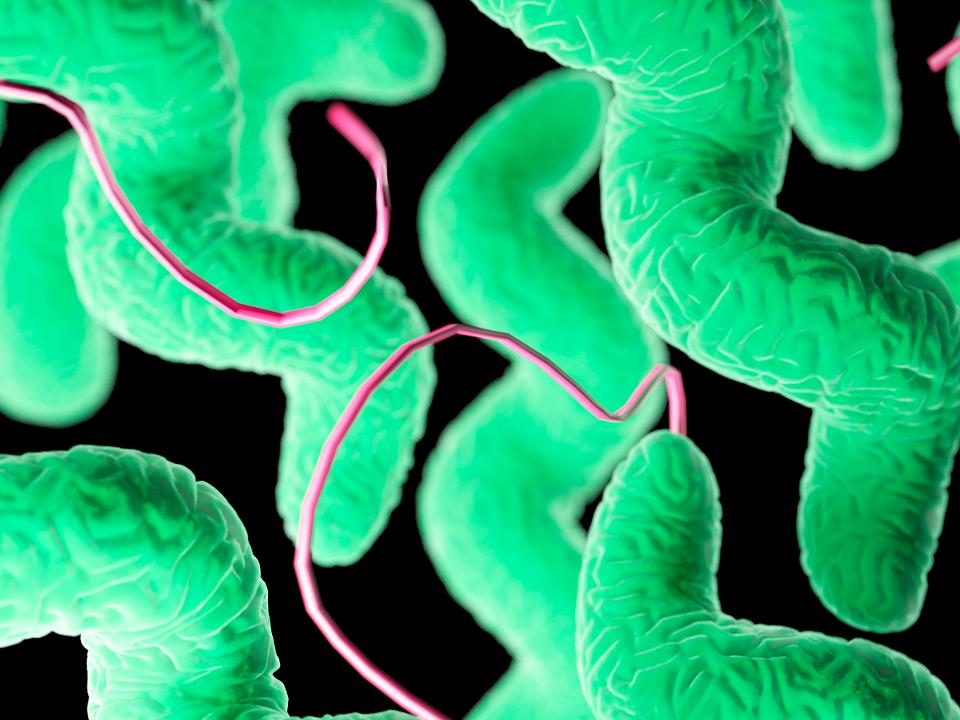
Will this puppy bring a hidden gift besides sunshine? (Photo: Getty Images)
Oh no, not puppies. Could that little wittle puppy dog, whom you just got from the pet store, who is staring at you with such puppy dog eyes, be in fact harboring a deep, dark secret?
According to the Centers for Disease Control and Prevention (CDC), that secret could be multidrug-resistant Campylobacter jejuni. There’s now an outbreak of Campylobacter with already 30 reported cases in 30 different states, resulting in at least 13 hospitalizations. It looks like puppies from pet stores may be the culprits as 21 of the 24 people interviewed reported having contact with a puppy. That’s contact as in physical contact and not simply exchanging WhatsApp (or WhatsPup) messages with a puppy.
Although Campylobacter jejuni may sound campy, it is anything but. Speaking of butts, that’s what’s frequently on the toilet when you have a Campylobacter infection. Typically, symptoms start two to five days after getting infected and consist of a week of fever, abdominal cramps, and diarrhea, which is often bloody. You may also feel nauseous and end up vomiting. If your immune system is strong, you usually can weather this poo storm without the need for any antibiotics. However, things get especially dicey when the bacteria occasionally makes it way into your blood stream, as the CDC describes. This is when alarm bells sound, because such an infection can cause all sorts of problems and even be life threatening, especially if your immune system is not up to snuff. This also when antibiotics come into play.

Here’s an illustration of Campylobacter jejuni, which is not as cute as puppies. (Photo: Getty … [+]
The problem is this particular strain of Campylobacter appears to be resistant to a number of different antibiotics. This includes a whole Justice League of antibiotics including tetracycline, ciprofloxacin, nalidixic acid, azithromycin, erythromycin, clindamycin, telithromycin, and gentamicin. This means that if you get really sick from this strain of Campylobacter, doctors may have fewer options to treat you. Oh, puppies what have you done.
Before you completely forego puppies and replace them with something like Netflix, you can take precautions and still enjoy the company of puppies. First of all, wash your hands frequently and thoroughly. This doesn’t mean just wave at the faucet. Instead, lather up with soap and water for at least 20 seconds each time. Use hand sanitizer only if there is no other option.
Secondly, don’t let your dog lick your face or any open wounds. Think about it. You don’t typically let people do this. And if you do let someone lick your face, you usually know that that person didn’t just stick his or her mouth in garbage or poo or other unmentionable things.
Thirdly, get your new puppy to the vet as soon as possible. Make sure that your puppy has a clean bill of health before interacting more heavily. Your puppy should be dressed to the canines from a health standpoint. This will be for both you and your puppy’s benefit. Again, wouldn’t you do the same for a human baby?

To counteract that Campylobacter picture, here is a picture of some more puppies. (Photo: Getty … [+]
Finally, thoroughly clean everything that your puppy has touched and keep your puppy away from food that you may eat. Remember that you only see a small percentage of what your puppy is doing each day. You have no idea what your puppy may be eating or licking. Just picture what they may be licking going right into to your mouth or eyes or ears or wherever. In the end, it’s not a pretty sight. Plus, their mouths are naturally full of germs.
This isn’t the first time puppies have caused such trouble. Last year, I wrote for Forbes about puppies causing a similar “Campy” outbreak. So, the aforementioned precautions should always apply, regardless of whether an outbreak is occurring. Before you say, wassup pup, remember that no matter how cute and adorable someone looks, he or she could be harboring some deep and dark secrets. Otherwise, have a nice day.
